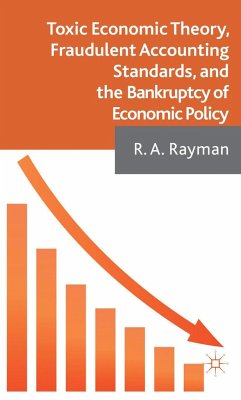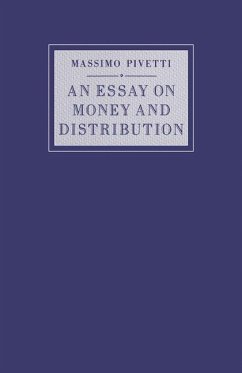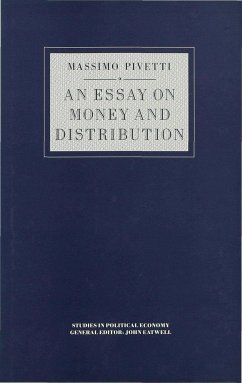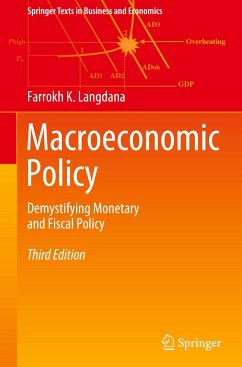
Martin Zagler
Gebundenes Buch
Endogenous Growth, Market Failures and Economic Policy
Versandkostenfrei!
Versandfertig in über 4 Wochen
Weitere Ausgaben:

PAYBACK Punkte
52 °P sammeln!





Endogenous Growth, Market Failures and Economic Policy develops, within a rigorous formal framework, innovative and unconventional macroeconomic policy perspectives that can be deduced from the New Growth Theory in the presence of market imperfections, adopting the standard structure of fiscal, monetary and trade policy for the book. For instance, the introduction of monopolistic competition leads to positive growth effects of fiscal policy as well as protection of infant industries.
MARTIN ZAGLER is Assistant Professor, Vienna University of Economics & B.A., Vienna. He previously studied at the J. Kepler-University of Linz, University of Aix-Marseille II, Vienna University of Economics & B.A., The Vienna Institute for Advanced Studies, and the European University Institute, Florence. He received the Stephan-Koren Price for the best dissertation at the Vienna University of Economics & B.A. in 1995/96 and the Theodor-Körner Price for his contribution to Growth policy in 1997. His fields of research are Intertemporal Macroeconomics, Endogenous Growth, New Keynesian Economics and Monetary and Exchange Rate Economics.
Produktdetails
- Verlag: Palgrave Macmillan / Palgrave Macmillan UK / Springer Palgrave Macmillan
- Artikelnr. des Verlages: 978-0-333-74705-6
- 1998.
- Seitenzahl: 199
- Erscheinungstermin: 14. Dezember 1998
- Englisch
- Abmessung: 216mm x 140mm x 16mm
- ISBN-13: 9780333747056
- ISBN-10: 0333747054
- Artikelnr.: 25554909
Herstellerkennzeichnung
Libri GmbH
Europaallee 1
36244 Bad Hersfeld
gpsr@libri.de
'Growth does not come like manna from heaven. This book explains why and gives the empirical results to show it. It thus allows challenging discussions of the trade-off between environment and growth and the effects of economic policy on growth. A novel feature of the book is the analysis of growth in open economies and, more particularly, the growth effects of the Common Market.' - Rick van der Ploeg, Professor of Political Economy, University of Amsterdam and member of the Dutch Parliament
'This book is required reading for economists dealing with long-run growth. It combines compelling empirical and theoretical analysis to provide informed policy advice.' - Professor Christian Keuschnigg, Department of Economics, University of
'This book is required reading for economists dealing with long-run growth. It combines compelling empirical and theoretical analysis to provide informed policy advice.' - Professor Christian Keuschnigg, Department of Economics, University of
Mehr anzeigen
Saarland
'Dr. Zagler's book is a stimulating combination of sound theoretical analysis and relevant economic policy applications. It demonstrates that the theory of Endogenous Growth can provide a valuable basis for discussions of real-world problems.' - Professor Dr. Ewald Nowotny, M.P., Vienna University of Economics and Business Administration. Chairman of the Finance Committee of the Austrian Parliament
'During the last two decades P. Romer's seminal contributions revolutionised our view of economic growth. Zagler's work extends in an original and path-breaking way the basic model and tries to answer several important questions, for instance: How does an environmental constraint fit into endogenous growth theory?What are the implications of foreign indebtedness or of protectionism? Can we observe long-run effects of short-run monetary policies in an endogenous growth context? This excellent book should be carefully studied by all economists interested in endogenous growth theory and some of its less obvious economic policy conclusions.' - Professor Dr. Herbert Walther
'The book is...an important and stimulating contribution to the theory and empirics of economic growth, also providing new perspectives on policies aimed at fostering growth.' - Maurizio Baussola, Catholic University, Piacenza
'Dr. Zagler's book is a stimulating combination of sound theoretical analysis and relevant economic policy applications. It demonstrates that the theory of Endogenous Growth can provide a valuable basis for discussions of real-world problems.' - Professor Dr. Ewald Nowotny, M.P., Vienna University of Economics and Business Administration. Chairman of the Finance Committee of the Austrian Parliament
'During the last two decades P. Romer's seminal contributions revolutionised our view of economic growth. Zagler's work extends in an original and path-breaking way the basic model and tries to answer several important questions, for instance: How does an environmental constraint fit into endogenous growth theory?What are the implications of foreign indebtedness or of protectionism? Can we observe long-run effects of short-run monetary policies in an endogenous growth context? This excellent book should be carefully studied by all economists interested in endogenous growth theory and some of its less obvious economic policy conclusions.' - Professor Dr. Herbert Walther
'The book is...an important and stimulating contribution to the theory and empirics of economic growth, also providing new perspectives on policies aimed at fostering growth.' - Maurizio Baussola, Catholic University, Piacenza
Schließen
Für dieses Produkt wurde noch keine Bewertung abgegeben. Wir würden uns sehr freuen, wenn du die erste Bewertung schreibst!
Eine Bewertung schreiben
Eine Bewertung schreiben
Andere Kunden interessierten sich für











